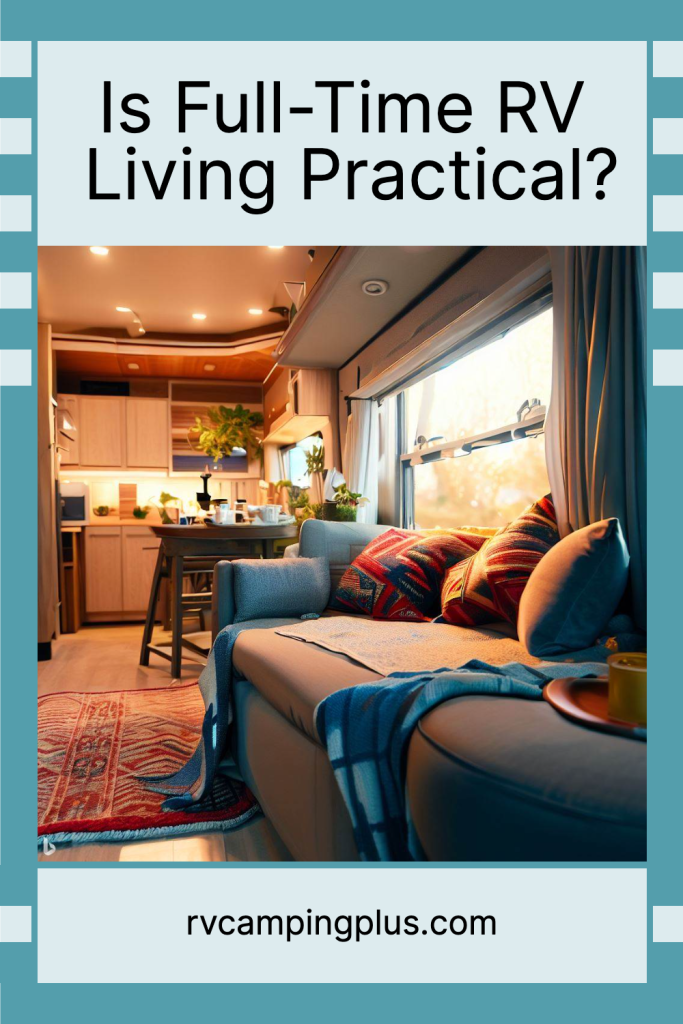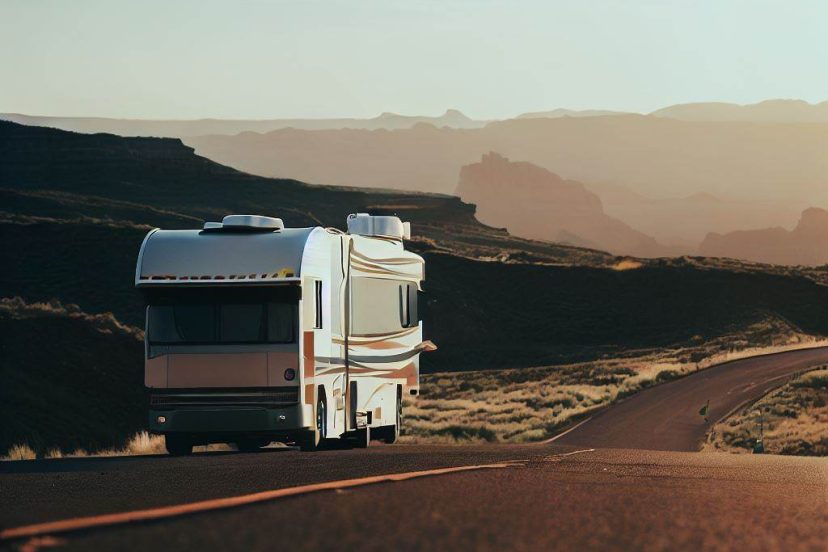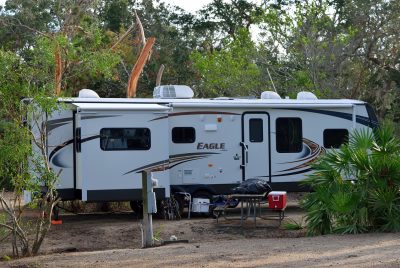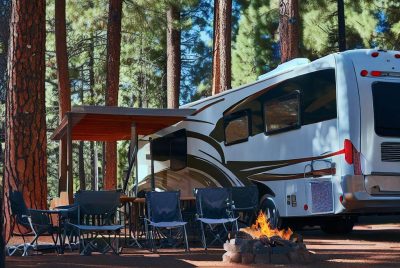Is Full-Time RV Living Practical and Financially Smart?
Welcome to the world of full-time RV living, where freedom, adventure, and simplicity intertwine to create a unique and fulfilling lifestyle. In this comprehensive guide, I will address the practicality, financial aspects, duration, downsides, and helpful suggestions for living in an RV full-time. This article covers everything from exploring the cost-effectiveness and customization of RV homes to understanding the challenges of winter living and income generation on the road. So, fasten your seatbelts and embark on a journey that will open your eyes to the wonders of full-time RV living.
Is it Practical and Financially Smart to Live in an RV Full Time?
In the first section of this guide, we will delve into the practicality and financial aspects of full-time RV living. We’ll explore the costs involved, compare them to traditional housing, and uncover the potential savings and investment value of RV living. From discussing the monthly expenses and the best types of RVs for full-time living to understanding the insights shared by financial experts, we’ll provide valuable insights to help you make an informed decision.
Embracing the Freedom and Duration of Full-Time RV Living
The second section takes us on a journey into the duration and freedom of living in an RV full-time. We’ll explore the 333 rule, 555 rule, and 222 rule that offer guidance for travel, relaxation, and destination selection. We’ll also address questions about living in an RV during winter, the challenges of keeping warm, and the strategies for making money while living on the road. With practical tips on insulation, heating methods, and income generation, we aim to empower you to confidently embrace the full-time RV lifestyle.
Exploring the Realistic Duration of Full-Time RV Living: Creating a Home on Wheels
Living in an RV full-time is an enticing proposition, but many wonder how long this lifestyle can realistically last. In this section, we will delve into the factors that influence the duration of full-time RV living and provide insights into creating a home on wheels that is comfortable and sustainable.
Exploring the Downsides and Addressing Challenges of Full-Time RV Living
In the final section, we’ll tackle the downsides and challenges of full-time RV living. We’ll discuss the difficulties of adjusting to a smaller living space, navigating unfamiliar territories, and managing resources. We’ll also address concerns about extreme weather conditions, including cold temperatures, and the measures you can take to stay comfortable and safe. By providing insights into the realities of RV living, we aim to help you prepare for and overcome the obstacles that may arise.
Is Full-Time RV Living Practical? Discover the Freedom and Affordability of Life on the Road
Are you tired of the daily grind and yearning for a life of adventure and freedom? Full-time RV living might be the answer you’ve been seeking. Embracing the open road and living in a recreational vehicle (RV) allows you to explore new places, connect with nature, and break free from the traditional constraints of a stationary lifestyle.
How Much Does It Cost Monthly to Live in an RV Full Time?
One of the most pressing questions for prospective full-time RV dwellers is the cost involved. While the expenses can vary depending on your preferred lifestyle, location, and personal choices, living in an RV full-time can generally be more affordable than traditional housing. Monthly costs range from $1,000 to $3,000, encompassing essential expenses such as fuel, campground fees, insurance, maintenance, groceries, and utilities.
You can significantly reduce costs by adopting frugal habits and embracing boondocking (free camping on public lands). Additionally, embracing renewable energy sources like solar power can help lower electricity expenses, making full-time RV living even more cost-effective.
Can You Save a Lot of Money Living in an RV?
Absolutely! Full-time RV living presents ample opportunities for saving money. By downsizing and decluttering your possessions, you’ll minimize materialistic tendencies and avoid unnecessary expenses. Moreover, living in a compact space encourages conscious consumption and reduces the temptation to accumulate more possessions.
RVers can also save significantly on property taxes, mortgage payments, and home maintenance costs. Furthermore, dining out can be limited by cooking your meals in the RV, leading to substantial savings. By adopting a minimalist mindset and embracing an economical lifestyle, you can redirect your funds towards experiences and adventures, creating memories that will last a lifetime.
Is Full-Time RV Living Cheaper?
Compared to traditional housing, full-time RV living can offer significant cost savings. With no mortgage or high rent payments, lower utility bills, and fewer expenses associated with maintaining a traditional home, you can allocate your funds towards experiences and adventures. However, it’s important to note that individual circumstances, lifestyle choices, and travel preferences can impact the overall costs.
What Type of RV is Best for Full-Time Living?
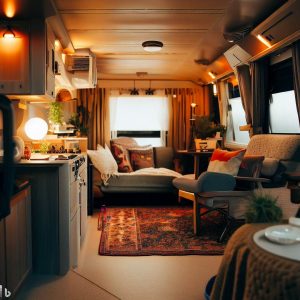 Choosing the right RV is crucial for a comfortable full-time living experience. Two popular options for long-term RVing are motorhomes and fifth wheels. Motorhomes provide a versatile all-in-one solution, combining a living space and a vehicle, making them more suitable for those who prefer mobility and convenience. On the other hand, fifth wheels offer spacious interiors and a more residential feel, making them an ideal choice for individuals seeking a homier atmosphere.
Choosing the right RV is crucial for a comfortable full-time living experience. Two popular options for long-term RVing are motorhomes and fifth wheels. Motorhomes provide a versatile all-in-one solution, combining a living space and a vehicle, making them more suitable for those who prefer mobility and convenience. On the other hand, fifth wheels offer spacious interiors and a more residential feel, making them an ideal choice for individuals seeking a homier atmosphere.
When selecting your RV, it’s essential to consider factors such as floor plan, storage capacity, durability, and fuel efficiency. Researching various models, attending RV shows, and consulting experienced RVers can help you find the perfect home on wheels that meets your specific needs and preferences.
Is an RV a Good Investment to Live In?
Investing in an RV for full-time living is a decision that requires careful consideration. While RVs depreciate over time, they can still be considered an investment in terms of the freedom, flexibility, and lifestyle they offer. Unlike traditional homes, RVs allow you to change your scenery whenever you desire, offering endless exploration possibilities.
Moreover, if you maintain your RV properly, you can mitigate depreciation and potentially sell it for a reasonable price in the future. The financial aspects aside, the intangible benefits of RV living, such as being closer to nature, meeting like-minded individuals, and embracing a simpler existence, make it an investment in personal growth and fulfillment.
Why You Should Live in an RV Full Time
Freedom and Flexibility: Full-time RV living grants you the freedom to choose your own backyard, wake up to breathtaking landscapes, and change your surroundings whenever the mood strikes. The flexibility to tailor your journey to your preferences and embrace new experiences is unparalleled.
Connection with Nature: RV living allows you to immerse yourself in the great outdoors, waking up to the sound of chirping birds, exploring national parks, and witnessing awe-inspiring sunsets. Nature becomes an integral part of your everyday life, bringing peace, serenity, and a renewed appreciation for the world around you.
Simplified Lifestyle: Living in an RV encourages minimalism, helping you declutter and focus on the essentials. With fewer material possessions, you’ll discover a sense of liberation, reduced stress, and increased mental clarity. Embracing a simpler lifestyle can lead to enhanced well-being and a greater appreciation for the little things in life.
Is It Possible to Live in an RV Year-Round?
Absolutely! RVs are designed to withstand various weather conditions, allowing you to live comfortably throughout the year. However, it’s crucial to plan your travels strategically, considering weather patterns and choosing destinations that align with your desired climate. Adequate insulation, efficient heating and cooling systems, and proper maintenance are key to ensuring a cozy and enjoyable living experience, regardless of the season.
Full-time RV living offers a unique and fulfilling lifestyle for those seeking freedom, adventure, and a break from the ordinary. By embracing a minimalist mindset, carefully selecting the right RV, and managing your expenses wisely, you can unlock the incredible benefits of life on the road. From connecting with nature and simplifying your existence to saving money and exploring the unknown, the possibilities are endless. So, why not embark on this remarkable journey and discover the wonders that await you as a full-time RVer?
Embrace Financial Freedom: Exploring the Cost-Effectiveness of Full-Time RV Living
Have you ever dreamed of hitting the road, exploring new destinations, and living life on your own terms? Full-time RV living offers an exciting and liberating lifestyle that allows you to break free from the constraints of traditional housing. Join me as we explore the question: Is it financially smart to live in an RV?
What Does Dave Ramsey Say About Living in an RV?
Renowned financial expert Dave Ramsey supports the idea of full-time RV living, especially for those seeking financial independence. He acknowledges the potential for substantial savings by eliminating mortgage payments, property taxes, and other expenses associated with owning a house. Ramsey encourages individuals to weigh the financial benefits and personal freedom of RV living against the traditional housing route.
What is the Cheapest Way to Live in an RV?
If you’re looking for the most budget-friendly way to embrace full-time RV living, boondocking is your answer. Boondocking refers to camping in your RV for free on public lands, without hooking up to utilities. By conserving water, utilizing solar power, and practicing responsible waste management, you can extend your stays in beautiful and serene locations without incurring any campground fees.
Additionally, joining RV clubs and organizations can provide access to discounted campgrounds, further reducing your accommodation costs. By carefully planning your routes and destinations, you can strike a balance between free camping and occasional paid campgrounds to meet your comfort and budget preferences.
Is an RV Loan Considered a Mortgage?
Contrary to a traditional mortgage, an RV loan is not considered a mortgage. Instead, it is classified as a consumer loan or a personal loan. This distinction is important because it affects the interest rates, tax deductions, and repayment terms associated with an RV loan. It’s crucial to consult with a financial advisor to understand the implications and make an informed decision.
How Do People Make Money Living in an RV Full Time?
Making money while living in an RV full time requires creativity and flexibility. Many full-time RVers pursue remote work opportunities, such as freelancing, consulting, or running online businesses. Others find seasonal work in popular tourist destinations or work-camp arrangements where they exchange work hours for a campsite and sometimes additional compensation. Embracing a minimalist lifestyle and being resourceful with expenses can also help stretch your funds while living on the road.
Can I Retire and Live in an RV?
Absolutely! Many retirees choose to embrace full-time RV living as a way to enjoy their golden years while maintaining financial stability. By downsizing their living space and eliminating the costs of homeownership, retirees can stretch their retirement savings and enjoy a more fulfilling and adventurous lifestyle. RV living allows retirees to travel, meet like-minded individuals, and create lasting memories while staying within their budget.
How Do I Decide to Live in an RV?
Deciding to live in an RV full time requires careful consideration and planning. Here are some key factors to ponder:
- Lifestyle Evaluation: Assess your desire for adventure, travel, and minimalistic living. Determine if the freedom and flexibility of RV living align with your personal goals and values.
- Financial Assessment: Review your budget, retirement savings, and income sources. Evaluate if full-time RV living can provide financial stability and fit within your long-term financial plans.
- Research and Education: Learn about the different types and brands of RVs, associated costs, maintenance requirements, and legal aspects. Attend RV shows, connect with experienced RVers, and gather insights to make an informed decision.
- Trial Period: Consider renting or borrowing an RV for short trips to experience the RV lifestyle firsthand. This can help you determine if it’s the right fit for you before making a long-term commitment.
Why Are People Living in RVs?
 People choose to live in RVs for a multitude of reasons. Some seek adventure and the freedom to travel at their own pace, while others value the simplicity and minimalist lifestyle that RV living offers. Living in an RV allows individuals to embrace nature, disconnect from the stresses of modern life, and create a closer connection with the environment. It provides an opportunity to live life on their own terms and prioritize experiences over material possessions.
People choose to live in RVs for a multitude of reasons. Some seek adventure and the freedom to travel at their own pace, while others value the simplicity and minimalist lifestyle that RV living offers. Living in an RV allows individuals to embrace nature, disconnect from the stresses of modern life, and create a closer connection with the environment. It provides an opportunity to live life on their own terms and prioritize experiences over material possessions.
In the quest for financial smartness and personal freedom, full-time RV living emerges as a compelling option. By eliminating the burden of mortgage payments, reducing monthly expenses, and embracing a minimalist lifestyle, living in an RV can provide a cost-effective and fulfilling lifestyle. So, if you’re ready to embark on an adventurous journey, explore new horizons, and embrace the beauty of the open road, consider the financial benefits and the incredible experiences that full-time RV living has to offer.
Exploring the Realistic Duration of Full-Time RV Living: Creating a Home on Wheels
Are you considering the allure of full-time RV living, but wonder how long this lifestyle can realistically last? As an avid enthusiast and advisor of RV camping, I understand the curiosity surrounding the duration of living in an RV. In this article, we’ll dive into the topic to provide helpful suggestions and reasons for your consideration. Join me as we explore the question: How long can you realistically live in an RV?
How Do I Make My RV a Permanent Home?
Transforming your RV into a permanent home requires careful planning and consideration. Here are some suggestions to make your RV a comfortable and functional living space:
- Customization: Personalize your RV to suit your needs and preferences. Consider modifications such as additional storage solutions, upgraded appliances, and efficient space utilization.
- Organizational Strategies: Implement clever organizational systems to maximize space. Utilize vertical storage options, collapsible furniture, and multi-purpose items to optimize every inch of your RV.
- Connectivity and Utilities: Ensure reliable connectivity by investing in a quality internet and cellular service. Additionally, consider upgrading your RV’s electrical and water systems to support long-term living.
- Routine Maintenance: Regularly maintain your RV to keep it in top condition. This includes roof inspections, plumbing checks, and servicing your generator to ensure all systems operate smoothly.
Is It Cheaper to Live in an RV or an Apartment?
Comparing the costs of RV living to apartment living can reveal significant savings. While expenses can vary depending on various factors, RV living often proves to be more affordable. Monthly costs can range from $1,000 to $3,000, covering essentials such as fuel, campground fees, insurance, maintenance, groceries, and utilities. These costs are typically lower than the expenses associated with renting or owning an apartment.
Additionally, RV living offers the opportunity to save on property taxes, mortgage payments, and home maintenance costs. By embracing a minimalist lifestyle, reducing materialistic tendencies, and cooking your meals in the RV, you can redirect funds toward experiences and adventures, making the financial aspect of full-time RV living more manageable.
Can I Claim My RV as a Home?
The eligibility to claim your RV as a home for tax purposes depends on various factors, including your country and local tax laws. In some cases, if your RV meets certain criteria such as providing sleeping, cooking, and bathroom facilities, it may be considered a primary residence. However, it’s important to consult with a tax professional or accountant who can provide guidance based on your specific circumstances.
What is a Permanent RV Called?
A permanent RV, also known as a “park model” or “destination trailer,” is designed for long-term or seasonal stays in one location. These RVs are typically larger, more spacious, and resemble small cottages or mobile homes. They often feature residential-style amenities, extended living areas, and can be set up on a permanent or semi-permanent site.
While the duration of living in an RV full time varies from person to person, it is indeed possible to embrace this lifestyle for an extended period. By following practical guidelines, customizing your RV for long-term living, and carefully managing your expenses, you can create a home on wheels that provides both comfort and flexibility. Whether you choose to live in an RV for months or years, the freedom, adventure, and sense of community that accompanies full-time RV living can be an enriching and rewarding experience.
Exploring the Realities of Full-Time RV Living: Addressing the Downsides
Living in an RV full time offers a sense of freedom, adventure, and the opportunity to embrace a simpler lifestyle. As an enthusiast and advisor of RV camping, I am here to provide an honest and balanced perspective on the downsides of this lifestyle. While the benefits are numerous, it’s important to be aware of the challenges that come with full-time RV living. Join me as we explore the topic of the downsides of living in an RV full time and provide helpful suggestions and reasons for your consideration.
Can You Live in an RV in the Winter?
Yes, it is possible to live in an RV during the winter months, but it requires special preparations to ensure comfort and safety. Some essential steps include insulating your RV, protecting water lines from freezing, using supplemental heating sources, and utilizing skirting to minimize heat loss. It’s crucial to research and implement winterization strategies specific to your RV model and the climate you’ll be residing in.
How Do You Live Full Time in an RV in the Winter?
Living in an RV during the winter months can present unique challenges, such as keeping warm and preventing freezing water lines. To combat the cold, consider insulating your RV, using space heaters or a furnace, and utilizing electric blankets or heated mattress pads. It’s also essential to take steps to prevent freezing, such as adding insulation to exposed water lines and using heat tape or a heated water hose.
How Cold is Too Cold for RV Living?
The ability to withstand cold temperatures in an RV depends on various factors, such as insulation, heating systems, and personal comfort levels. Most RVs are equipped with heating systems, but they may struggle to keep up in extremely cold conditions. It’s generally recommended to avoid sustained temperatures below freezing to prevent frozen pipes and potential damage. However, with proper insulation, skirting, and effective heating methods, RV living can still be comfortable in colder climates.
How Do I Heat My RV in the Winter?
There are several ways to heat your RV during the winter months. Utilizing the built-in furnace is the most common method, but it may consume propane quickly. Supplemental heating options include portable electric space heaters, ceramic heaters, or even wood-burning stoves for those with the appropriate setup. It’s important to ensure that your chosen heating methods are safe, efficient, and comply with RV safety guidelines.
Is It Hard to Keep an RV Warm in Winter?
Keeping an RV warm in winter can be challenging, especially in extremely cold climates. Proper insulation, sealing drafts, and using efficient heating methods are key. Adequate insulation in walls, floors, and ceilings helps retain heat, while draft seals around windows and doors minimize heat loss. Additionally, utilizing thermal curtains or window coverings can provide an extra layer of insulation. It’s important to monitor temperatures inside the RV and adjust heating methods accordingly to maintain a comfortable living environment.
How Difficult is It to Live in an RV?
Living in an RV full time can come with its share of challenges. Adjusting to a smaller living space requires organization, decluttering, and adapting to a minimalist mindset. It’s crucial to carefully plan your travels, navigate unfamiliar territories, and manage resources such as water and electricity. Maintenance and repairs are also part of the RV lifestyle, so being handy or willing to learn basic repair skills can be beneficial. While there may be difficulties, many RV enthusiasts find that the rewards of the lifestyle far outweigh the challenges.
As we come to the end of this comprehensive guide, we hope that you’ve gained a deeper understanding of the multifaceted world of full-time RV living. From the practicality and financial considerations to the duration, freedom, downsides, and challenges, we’ve covered a wide range of topics to provide a holistic perspective. Remember, full-time RV living is a lifestyle choice that offers freedom, adventure, and a break from the ordinary. By embracing the suggestions and insights shared in this guide, you can embark on a remarkable journey that will open your eyes to new horizons, create lasting memories, and provide a sense of fulfillment that only the open road can offer. So, are you ready to take the leap and embrace the extraordinary world of full-time RV living? The road awaits!
FAQs
Can I legally live in an RV full time?
The legality of living in an RV full time varies depending on local zoning and regulations. Some areas have restrictions on long-term RV occupancy, while others allow it under certain conditions. It’s important to research and understand the specific laws and regulations in the areas you plan to reside in.
Do I need a special driver’s license to drive an RV?
In most cases, a regular driver’s license is sufficient to drive an RV. However, larger RVs may require a special license, such as a commercial driver’s license (CDL), if they exceed certain weight or length limits. Check the requirements in your state or country to ensure compliance.
What are the insurance requirements for full-time RV living?
Insurance requirements for full-time RV living can vary, but it’s important to have comprehensive RV insurance that covers liability, property damage, and personal belongings. Some insurance providers offer specific policies designed for full-time RVers. Be sure to discuss your needs with an insurance agent who specializes in RV coverage.
What are the challenges of homeschooling while living in an RV full time?
Homeschooling on the road can come with its challenges, such as limited space for educational materials and potential distractions. However, many full-time RVing families successfully homeschool their children by utilizing online resources, joining homeschooling communities, and incorporating experiential learning opportunities during their travels.
What are some safety considerations for full-time RV living?
Safety is a top priority when living in an RV full time. It’s important to secure your RV properly when parked, invest in quality locks, and be mindful of your surroundings. Understanding basic RV maintenance and safety procedures, such as regularly checking propane and smoke detectors, is also essential. Additionally, staying informed about weather conditions and having an emergency plan in place are crucial aspects of RV safety.
Please note that these answers are provided as general guidance, and it’s important to research and consult with relevant authorities or professionals to obtain accurate and up-to-date information based on your specific circumstances and location.
